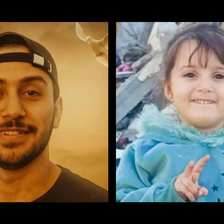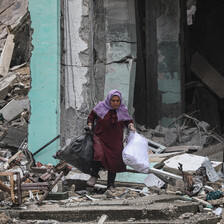The Electronic Intifada 16 May 2024

Teachers set up classes in Rafah’s tents before Israel’s recent invasion of the city.
APA imagesThe challenges faced by Gaza’s children defy the imagination.
For more than 220 days, they have been terrorized.
Formal education was an early casualty of the current genocidal war. With schools destroyed, damaged or turned into shelters for displaced people, a generation has been denied its right to learn.
Every time I see children, I feel sorrow for their lost childhood. I keep on wondering how long it will take before all of Gaza’s kids can go back to school.
Before the current war, I had spent two years teaching English in Tel al-Hawa, a neighborhood of Gaza City.
While Israel appears determined to foster ignorance, I am adamant that my experience should be used in resisting the erasure of our people.
And so I have offered my services as a teacher since being uprooted from my home.
In early March, I gathered together children in the camp where I was staying in the southern city of Rafah.
First, I divided them into three groups.
The first group was for children from 5 to 7, the second for the 8 to 10 age range and the third for those between 11 and 14.
After drawing up a timetable for each group, I started teaching from 9 am to 1 pm.
The children displayed great enthusiasm. Every morning, I would hear them outside my tent saying “Miss, it is time for lessons.”
I was actually shocked by the large number of children coming to my tent. All of them wanted to join the lessons.
Still, I welcomed them wholeheartedly and embraced the opportunity to teach as many as possible.
My goal was to reinforce the importance of having a routine. That way I could encourage children to wake up each morning thirsty for knowledge.
Starting from scratch
As I thought about what curricula would be suitable for the various ages, I soon discovered that the children had forgotten much of what they had previously learned.
That meant I had to start from scratch: reviewing the alphabet, counting from one to 10.
I put a heavy emphasis on songs and games.
The lessons allowed children to detach themselves from the harsh realities of war. They felt that they were in something of a safe haven as they played, laughed and enjoyed learning.
Israel’s aggression shattered this illusion when there was an attack perilously close to our camp.
I and my students came out of the tent serving as the classroom. We were horrified to see the effects of the attack.
One of the students trembled and compared the attack to a ghost “that scared us during our class.”
At the end of each class, I reminded my students that it was important to review their lessons with their mothers.
“But Miss, my mother was martyred,” one student said, weeping.
For a moment I was speechless as the student asked who could supervise his homework. Then I hugged him.
I invited him to my tent so that we could review the lessons together.
On another occasion, a boy named Amir appeared distressed.
“What is wrong, Amir?” I asked.
Amir replied that he had forgotten to bring his books and school bag from his home in Jabaliya, northern Gaza. “They are gone now because my home is destroyed,” he said.
I told him that we will go back to our homes and rebuild them. We will buy new bags and books.
Lifting my spirit
When my classes neared their end, I would inform students that they should return to their tents. To my surprise, they would protest and insist that they needed to be taught more.
When I saw the eagerness of the children, I no longer felt tired.
Their protest lifted my spirit. It proved that children are challenging Israel’s attempts to foster ignorance.
After two months, it became too dangerous to arrange classes.
During the two days before Israel’s recent invasion of Rafah, we heard much shelling nearby.
I was afraid to gather the children for lessons. It was better, I felt, for them to stay in their tents with their families.
When the invasion did occur, it became clear that we would have to leave the camp. I fled to al-Mawasi, another area in the south.
Being separated from my students was heartbreaking. We were unsure if we would ever be able to reunite.
But I assured them that we would resume our lessons at the first opportunity. And if that chance will never arise, I urged them to nonetheless prioritize their education.
Now, I find myself in unfamiliar surroundings. I don’t know where my students are.
I don’t even know if they are still alive.
A friend who remained in Rafah after the invasion informed me that Israel attacked the land where our camp was located.
While I had great affection for the children I taught before the war, the bond I developed with the kids in Rafah was unique. I long to see them again and hear their stories.
Now that I am in al-Mawasi, I am on a quest to find a new tent that I can transform into a classroom.
The desire for education is indomitable.
As long as there are children eager to learn, I will find a way to teach them.
Razan Abu Salem is a writer and translator based in Gaza.





